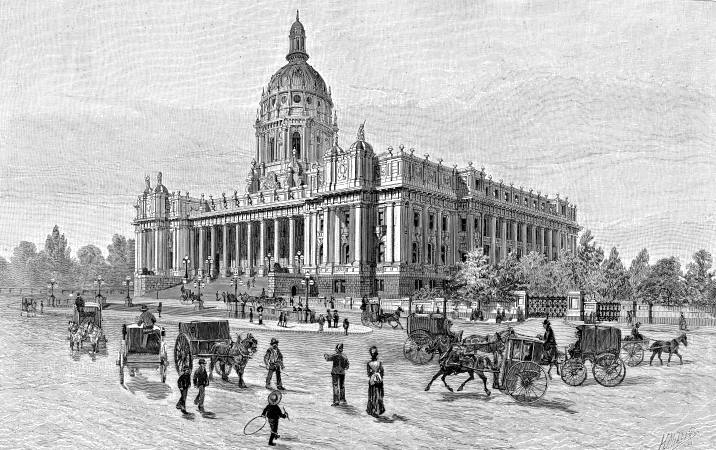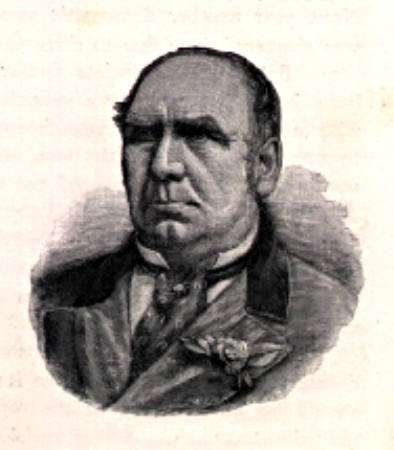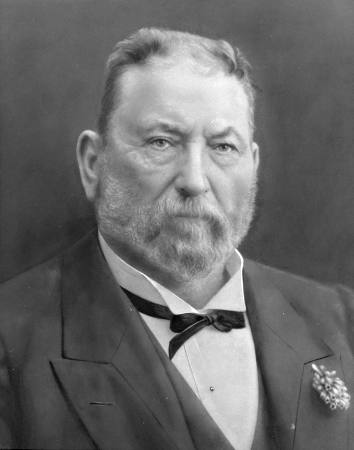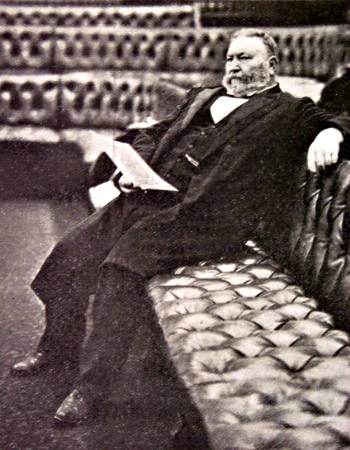Verbal Battle of Two Titans

Etching of the Victorian Parliament House as originally proposed. Its construction was never completed. 1887. Courtesy Kingston Collection.
The two Titans, John O’Shanassy and Thomas Bent, shared similar attributes but there were also differences. Both were politicians and members of the Victorian Parliament serving for more than a decade. Both held large land holdings at various times in what is now the City of Kingston. Both were verbally articulate. Both had a strong strain of egotism. Both served as Premiers of Victoria and were immensely ambitious. But there were significant differences. In age they differed by twenty years. O’Shanassy was a loyal Roman Catholic born at Ballynahow in Tipperary, Ireland, in 1818. Bent, born in 1838 at Penrith, New South Wales, a Protestant, was the eldest son in a family of six children. Their entry into parliament occurred at different times, O’Shanassy in 1851 and Bent in 1871.
John O’Shanassy as a grazier in the Parish of Mordialloc held a squatter’s licence authorising him to graze cattle over 40,000 acres of what he described as ‘heath cursed country’. He had children born in the district. In 1845 he surrendered this licence, suggesting it was impossible to make sufficient money to pay his servants. He returned to Melbourne taking up the role of shopkeeper but in 1851 successfully stood for parliament, being elected as the member of the Legislative Council for Melbourne. On three occasions he was Premier of the State. From 1877 to 1883 he was the member for Belfast in the Legislative Assembly but he was not a member of Sir Bryan O’Loghlen’s ministry in 1881 and during 1882 was impotent in opposition. He was knighted by Queen Victoria in 1874 and made a papal knight by Puis IX in 1866.

Sir John O’Shanassy. Courtesy Kingston Collection.
Thomas Bent, a market gardener in East Brighton, was elected to the Moorabbin Roads Board in 1863. Over the next forty years he speculated in numerous land purchases in Brighton, Cheltenham and many other locations. He became a powerful figure as at various times he was Mayor of Brighton, President of the Shire of Moorabbin and member for Brighton in the Legislative Assembly in the Victorian parliament. Bent won his first election to parliament by standing against George Higinbotham the sitting member for Brighton in 1871, on the slender margin of fourteen votes, a victory some claim was due to his manipulation of the electoral rolls. Rumours were also circulated that he was encouraged to stand by squatters, papists and publicans a call which he strenuously denied. He said he put his name forward at the solicitation of many neighbours who knew him as collector, auditor, member and two years chairman of their district board. [1] Bent failed in the election of 1894 and retired to a dairy farm in Port Fairy but made a comeback in 1900 as member for Brighton. During this time of retreat he continued his membership of the Brighton and Moorabbin councils. In 1904 he became Premier of Victoria, was knighted in 1908, and died in 1909. At the time of his death he was still the member for Brighton and councillor at both Brighton and Moorabbin.
In 1881 Bent was appointed Commissioner of Railways in the Bryan O’Loghlen government at a time when railways were playing a significant role in providing access to land being subdivided thus facilitating the accumulation of massive profits by speculators. On 20 July1882 the members of the Legislative Assembly sitting in committee debated the merits of legislation, put forward by Bent, detailing priorities and future plans to expand the railway network throughout Victoria. First on the list was an extension to the Brighton line to Picnic Point (Sandringham) and Cheltenham linking up the Brighton and Mordialloc lines. This inclusion was viewed by many politicians as being slipped in despite an earlier agreement that country lines would be given priority. It was during the debate on the Brighton – Cheltenham Line proposed legislation that the sharp interchange between O’Shanassy and Bent occurred.

Thomas Bent, held the positions of President of the Shire of Moorabbin, Mayor of Brighton, Member of the Legislative Assembly and Premier of the State. Courtesy Kingston Collection.
O’Shanassy queried whether the arrangements agreed to on a previous night to postpone suburban lines with the view of considering country lines was to be adhered to. He went on to say he objected to lines being considered on their merits. In his view the suburbs were well supplied with railways. He knew the present and past aspects of the country through which the proposed line to Cheltenham would run. It was a barren wilderness upon which a rabbit could not feed, he said. He acknowledged that with the line to Brighton the coast had become a popular resort for people, and some had settled in the area, but to speak of a large population was bare nonsense. People who visited Brighton to bathe walked to Picnic Point, or picnicked on the Esplanade. In his opinion it was absurd to want to construct a railway to take them to the Point. Railways already existed to Brighton and Cheltenham and that was sufficient.
L. L. Smith, the member for Richmond, agreed the soil was sandy and, at the time, of little value but with manure and water it would make the best vegetable land in the country. While Mr Harris, member for St Kilda, argued the loop line would facilitate the transport of bodies from Brighton, Prahran and St Kilda to the new cemetery being constructed at Frankston.
Defending the government’s proposals, Bent pointed out the Brighton-Cheltenham line could be constructed for £10,000 and at that time Brighton residents who wished to visit Mordialloc had to travel via Melbourne. Sir John chipped in asking the Minister What do they want to go to Mordialloc for? He suggested the committee should show strength by declining to accept the bill as not one in a thousand Brighton people would want to go to Mordialloc. Priority should be given to country districts which were dying for want of railway communication.
Bent responded, arguing the market gardeners who cultivated the soil in the district through which the line would run had as a great a right to consideration as the country farmers in sending their crops to market. Bent, using the fact that bricks had been delivered to Brighton North station, as part of his argument, was interrupted again by Sir John with the question Why, cannot they make bricks at Brighton? Bent reacted with the comment The Hon member had better go to the other side of the House suggesting Sir John O’Shanassy should be disciplined for his disruptive behaviour. Discord in the House was the result of this interaction followed by sharp verbal exchanges between the two politicians.
Sir John asked what authority did the Minister of Railways have to tell him where to sit and went on to suggest he would be the person along with others who would put the Minister out from where he is now. Bent suggested O’Shanassy would have the right to complain if he came to the House only to be interrupted and attacked as he worked to do his duty with a threat to put him out of his place.
Sir John said he would do it as soon as he could, indicating he put Bent into office and he would put him out, stressing Bent only got in because of his help.
In a retort Bent claimed the electorate of Brighton respected and had confidence in him. He challenged O’Shanassy to put him out emphasising he didn’t want his vote. If I went to Brighton with the support of Sir John O’Shanassy I should not get 100 votes. Many constituents would say, What! You in league with Sir John O’Shanassy, the great squatter. … You have been the friend of the industrial classes all these years, you have done all you can to assist the horny handed sons of the soil … you have done all you can to ameliorate the conditions of the class from which you spring. No never! It would never be believed. … If the Hon. Gentleman, who goes down to Brighton to see the Bishop once or twice a week, were to get all the fulminations he can, he would not make them believe it.
Members of the House protested at the waste of time caused by the pursuit of personal issues. Mr McLean said the behaviour of the Minister of the Crown was contemptible. Members voiced their agreement. This did not prevent O’Shanassy from re-launching his attack. Considering the position and antecedents of the Minister of Railways he has no right to tell me, who have been in Parliament over 30 years, to go to the other side of the House, speaking as he did in the tone of the Czar of Russia. Could flesh and blood stand such a thing? (Laughter) The Hon. Gentleman said he did not want my alliance. How is it that at this moment, when he is at the last gasp of political death, he does not say how he began his political life? He began life – and I do not mention this because the Hon. Member commenced life in a humble way, for I pride myself on having risen from a humble position – but the Hon. Member was in a very humble position when I gave him his first appointment in this colony as electoral registrar of Brighton and he stood against Mr Higinbotham, and was elected through my instrumentality. …. Tonight he says he does not want me, whilst he used my influence to get into the position of Minister of Works, and secondly as Minister of Railways. I have never found in the whole course of my political career a more treacherous political man than the Minister of Railways. He has been treacherous to every party, and will be treacherous to the end. This statement was followed by disorder in the House.

Thomas Bent sits in the Legislative Assembly, Parliament House, Melbourne 1900. Courtesy Kingston Collection.
Sir Bryan O’Loghlen, the leader of the government, pointed out that the members of the Assembly were the ones who should resolve where a large sum of public money should be spent on the railway project rather than letting the decision pass to the members in the Legislative Council. The heated discussion which had taken place was mainly due to Hon. Members interrupting other Hon. Members when they were addressing the committee, and it would be better for the sake of business if these interruptions did not take place.
Mr Longmore, the member for Ripon and Hampden, proposed that the line should stop at Picnic Point rather than continuing to link with the Mordialloc line. Sir Bryan then announced that the government would accept the amendment. The voting that followed had the amendment being passed with a majority of twenty votes. There were forty one ‘yes’ votes with twenty one against. As might be expected, Sir John O’Shanassy was amongst the no voters demonstrating their opposition to the total idea of the Brighton via Picnic Point to Cheltenham line while Bent voted with the majority accepting the idea of an extension of the line from Brighton Beach to what was to become Sandringham.
Footnotes
- Brighton Southern Cross, 11 March 1871.
- The Argus 21 July 1882, page 9.
